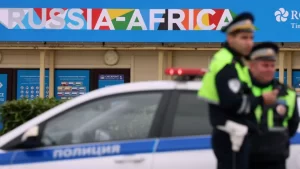Putin offers African countries Russia’s ‘total support’
4 min read
Russian Foreign Minister Sergei Lavrov read out Vladimir Putin's speech to the gathering. BBC

Russian Foreign Minister Sergei Lavrov read out Vladimir Putin's speech to the gathering. BBC
At a summit in Sochi, Russian President Vladimir Putin, through his Foreign Minister Sergei Lavrov, offered Africa what he called “total support,” promising assistance in various areas, including combating terrorism, extremism, epidemics, food insecurity, and the effects of natural disasters. The speech came at a time when several African countries, frustrated with Western influence, are increasingly looking to Russia for alternative partnerships, particularly in light of growing threats from jihadist groups.
This summit, which took place on the Black Sea coast, marked a significant moment in Russia’s outreach to Africa. Several African governments have distanced themselves from traditional Western allies, especially former colonial powers, and are now turning to Moscow for help. The growing influence of Russia is being seen as a counterbalance to the perceived neo-colonialism of the West. In particular, Burkina Faso’s Foreign Minister Karamoko Jean-Marie Traoré remarked that Russia was a more suitable partner than France, a sentiment echoed by Mali’s Foreign Minister Abdoulaye Diop, who referred to the West’s relationship with Africa as “neo-colonial,” in contrast to what he described as the “sincere” partnership offered by Russia.
Mali, in particular, has moved closer to Russia, not just in military cooperation but also in sectors such as energy, telecommunications, technology, and mining. Diop highlighted that Russian companies were playing a key role in these areas, working alongside the Malian government and local private partners to tackle the country’s challenges. He noted that the pace of cooperation would increase to ensure quicker results for the people of Mali.
While Russia’s involvement in Africa is often framed as a strategic partnership, critics point to the role of the Wagner Group, a private Russian military contractor that has operated in several African nations, particularly in Mali, Burkina Faso, and Niger. The Wagner Group, now rebranded as the “Africa Corps” under the Russian Ministry of Defence, has become a preferred partner for military leaders in these countries, who have ousted French and UN forces. Russian military support often comes with the promise of non-interference in the country’s internal affairs, a stark contrast to the West, which has frequently been criticized for meddling in African elections and governance.

However, despite Russia’s growing influence, its military efforts in Africa have yielded mixed results. In Mali and Burkina Faso, Russian support has helped protect the military junta leaders in power but has made little headway in addressing the growing threat from Islamist militants. The situation remains volatile, and while Russia champions its growing influence, the results on the ground remain far from decisive.
Russian officials, including Foreign Ministry spokeswoman Maria Zakharova, have seized on these developments to counter claims of Russia’s international isolation. She asserted that the conference in Sochi demonstrated that Russia’s relations with Africa were strengthening “more and more” and that progress was being made across multiple sectors. Lavrov also noted that Russia was increasingly seen as a reliable partner, offering Africa a more favorable alternative to traditional Western alliances.
Putin’s speech reiterated Russia’s commitment to providing “total support” to African nations, emphasizing cooperation in areas such as development, counterterrorism, and humanitarian aid. While this rhetoric is meant to underscore Russia’s growing influence, it also reflects the complex geopolitics at play in the Sahel and broader African region, where multiple powers, including Saudi Arabia, Turkey, and Iran, are vying for influence.
For African leaders, diversifying their international partnerships has become a pragmatic strategy. Emanuela Del Re, the EU’s special representative for the Sahel, highlighted the shifting allegiances in the region, pointing out that Africa is no longer exclusively aligned with the West. She stressed that the EU should not abandon its ties with countries like Burkina Faso, Mali, and Niger, which have seen recent coups. Del Re argued that this should not be seen as a competition between the West and Russia, but rather as a recognition of Africa’s need for multiple partners to address its diverse challenges.
One country with strong ties to the West, Rwanda, is also forging deeper links with Russia. Rwanda has signed agreements with Moscow to build a nuclear power plant, and its Foreign Minister Olivier Nduhungirehe noted that many Rwandan students had graduated from Russian universities, specializing in fields like nuclear science. Rwanda sees these agreements as a way to bolster its scientific and technological capabilities, with hopes of training more local experts in the future.
Although Putin’s initial promises to double trade with Africa have not materialized, Russia’s growing influence on the continent cannot be overlooked. Through strategic partnerships, military support, and engagement in sectors like energy and mining, Russia is carving out a stronger presence in Africa—one that is increasingly seen as an alternative to Western influence.
In conclusion, Russia’s efforts to expand its footprint in Africa, offering what it terms “total support,” reflect a significant shift in geopolitical alliances. While its military assistance and economic ties are still developing, Russia’s strategic partnerships with African nations are becoming an important counterbalance to the West’s historical dominance on the continent.